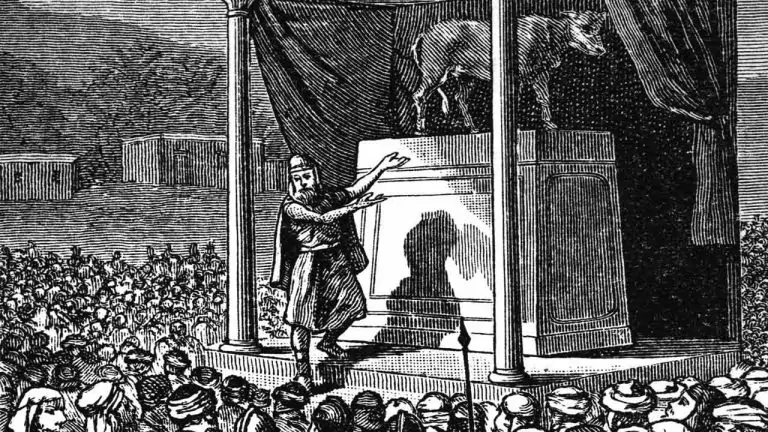This month’s devotionals are a study of the book of Amos. The prophets can be difficult to understand and, at times, abrasive in tone. Amos is no exception. He speaks with very tough words to a stiff-necked people. And yet, we must make no mistake about this: these are words of tough love from our covenant God. Even as His people plunge headlong down the pathway of apostasy, He never stops calling, warning, pleading – even roaring like a lion.
Some historical background will be helpful: The year is approximately 750 BC. It is nearly 200 years after the dividing of the kingdoms. In 722 BC, Israel will be defeated by the Assyrian army and will never rise again. Judah will continue on for another 130 years or so until its exile to Babylon in 586 BC.
The prophet Amos comes from the southern kingdom of Judah (along with Benjamin) and preaches to the northern kingdom of Israel (the other 10 tribes of Jacob). The two kingdoms split during the reign of Solomon’s son, Rehoboam. Under the leadership of Jeroboam I, the 10 northern tribes of Israel seceded from Judah. From that time forward, the southern kingdom was usually referred to as Judah and the northern kingdom was called Israel.
Judah had a number of faithful kings throughout its history. Israel never had one truly faithful king. Jeroboam I had built altars to golden calves at Dan and Bethel as replacements of the temple in Jerusalem. He still professed to follow the LORD, but told Israel to worship the LORD through the golden calves. It was a political move to prevent Israelites from going to Jerusalem, but it determined the spiritual course of Israel. No king of Israel removed the altars at Dan and Bethel. From day one, the northern kingdom of Israel was engaged in false worship.
I have been greatly blessed by meditating on the book of Amos. In particular, it has deepened me in the fear of the Lord. May God give us all ears to hear what the Spirit has to say to us through His faithful servant Amos.
In the days of Jereboam
The words of Amos, who was among the sheepbreeders of Tekoa, which he saw concerning Israel in the days of Uzziah king of Judah, and in the days of Jeroboam the son of Joash, king of Israel, two years before the earthquake. – Amos 1:1
Scripture reading: Amos 1:1; 2 Kings 14:23-29
“It was the best of times, it was the worst of times”. This opening line from Dickens’ novel A Tale of Two Cities might as well have been describing the nation of Israel in the days of Amos.
It was the best of times. Life was good in the kingdom of Israel. King Jeroboam II enjoyed a long and peaceful reign. He extended the nation’s borders to what they had once been under David and Solomon. He had an impressive list of military achievements. And the economy was booming. The Kingdom of Israel had never enjoyed this kind of prosperity since separating from the kingdom of Judah almost 200 years earlier.
It was also the worst of times. King Jeroboam walked in the ways of his fathers and propped up idol worship. It was a time of empty religion and social injustice. The prophet Hosea, a contemporary of Amos, said of Israel, “There is no truth or mercy or knowledge of God in the land. By swearing and lying, killing and stealing and committing adultery, they break all restraint, with bloodshed upon bloodshed” (Hosea 4:1-2). Underneath the surface, Israel was rotten and the axe was about to be laid to the root of the tree.
The Word of God has a telling evaluation: Jeroboam “did evil in the sight of the LORD”. Peace, prosperity, success – these are gifts from the Lord. But apart from God, they have no lasting value, no eternal legacy. One thing matters above all: what is God’s evaluation of your life?
Suggestions for prayer
Pray for civil leaders to align their priorities with God’s priorities. Pray for grace to set apart the Word of God as your authority in everything.
Rev. Gary Zekveld is the pastor of New Westminster United Reformed Church in British Columbia, This daily devotional is available in a print edition you can buy at Nearer to God Devotional.












